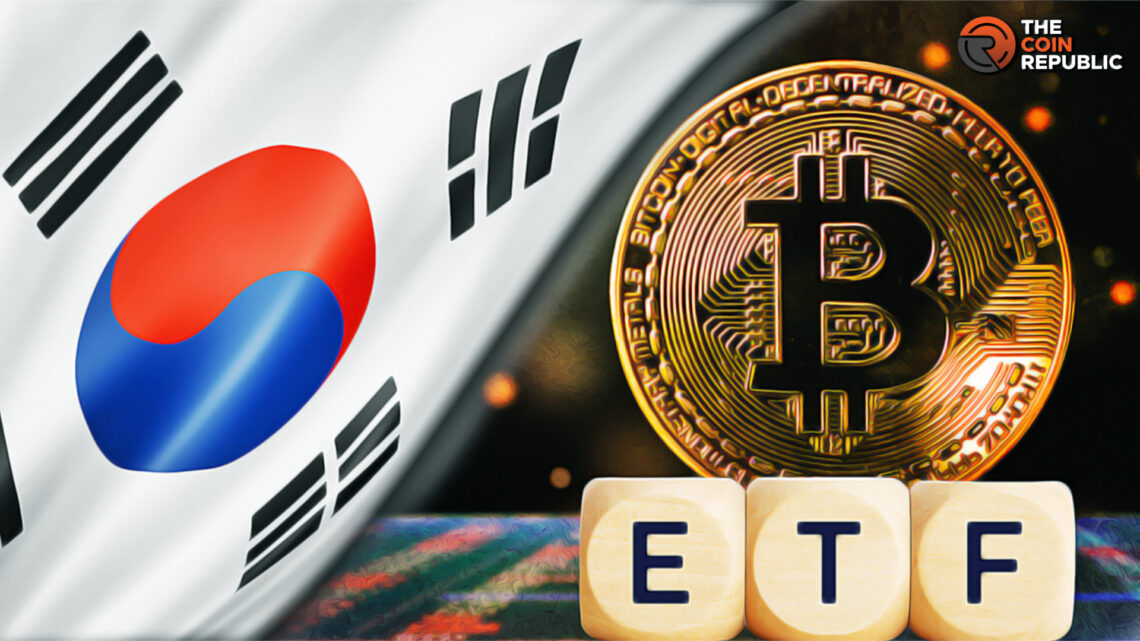- 1 South Korea warned last week against trading US spot BTC ETFs.
- 2 The presidential office now urges financial regulators to rethink their position.
- 3 The country also mulls cracking down on crypto mixing services.
The nation’s top office wants regulators to reassess this strict no-go approach just days after South Korea cautioned securities firms against dealing in American spot bitcoin exchange-traded funds (ETFs).
The sudden backpedaling spotlights policymakers’ ongoing struggles with crafting appropriate crypto oversight still in its early stages. It also risks sowing industry confusion as rules whipsaw back and forth.
Financial Watchdog Sounds the Alarm
Last Wednesday, the initial anti-ETF salvo occurred. South Korea’s Financial Services Commission (FSC) released a brief statement opposing domestic brokers trading or distributing US spot bitcoin ETFs.
The financial watchdog suggested this activity “may violate” the National Capital Markets Act, which is meant to ensure fair investment products and practices.
However, the FSC also conceded the country’s crypto governance framework remains in flux as asset classes evolve rapidly. It pledged to review policies against global developments continually.
Presidential Office Pushes Back
Despite regulators’ fresh warning, the Office of the President wants the FSC to rethink a ban on spot bitcoin ETF exposure based on risks.
“We are trying to make appropriate changes to our country’s legal system or to consider whether what happens abroad can be accepted in our country,” said policy office head Tae-yoon Sung on Wednesday, according to local reporting.
Beyond focusing narrowly on perceived dangers, Sung suggested that Korea should also holistically assess the potential upsides of allowing access to foreign ETFs.
This immediate policy whiplash demonstrates disjointed views between political leaders and appointed financial overseers on embracing crypto innovation.
Weighing Pros and Cons
Industry observers note that South Korea wants to support financial innovation like blockchain. However, fears of destabilization lead to reactive policy positions between different government arms.
They expect ongoing debates around permitting access to offshore investment vehicles with crypto exposure even as Korean regulators pledge coordinated strategies.
Cracking Down on Crypto Mixers
Meanwhile, beyond the ETF confusion, South Korea is also targeting privacy tools like cryptocurrency mixing services for greater supervision.
The country’s Financial Intelligence Unit (FIU) recently disclosed plans to unveil mixer regulations after the US-sanctioned tools that anonymize on-chain fund flows.
Officials fear digital asset mixing enables illicit money laundering and terrorist financing by obscuring transaction histories.
However, crypto advocates argue that limiting anonymity erodes civil liberties and financial privacy rights. Overly broad anti-mixing rules could also constrain technology development.
It represents another flashpoint as legislation catches up to bleeding-edge fintech applications.
Ongoing Regulatory Balancing Act
Like most jurisdictions, South Korea continues facing difficulties promoting blockchain innovation while mitigating risks as the central bank digital currency era dawns.
This leaves rules subject to constant debate and revision between opposing viewpoints.
Allowing access to spot bitcoin ETFs contradicts past warnings for investors to exercise caution with crypto products promising unrealistically high returns.
However, prohibiting new tools could hinder financial advancement and consumer access.
Conclusion
This week’s conflicting guidance around trading US spot bitcoin ETFs symbolizes South Korea’s uncertain approach to defining appropriate cryptocurrency oversight.
What regulators initially forbid as hazardous, presidential advisors urge the financial watchdog to reassess more objectively.
As other advanced economies fine-tune policy frameworks, Seoul struggles to settle on enduring strategies that balance prudence and permissionless innovation.
Ongoing domestic clashes around embracing or restricting specific crypto offerings show that governance still lacks coherence in Korea. Until controlling agencies and political leaders achieve consensus, confusion and mixed signals for local industry players will persist.

Adarsh Singh is a true connoisseur of Defi and Blockchain technologies, who left his job at a “Big 4” multinational finance firm to pursue crypto and NFT trading full-time. He has a strong background in finance, with MBA from a prestigious B-school. He delves deep into these innovative fields, unraveling their intricacies. Uncovering hidden gems, be it coins, tokens or NFTs, is his expertise. NFTs drive deep interest for him, and his creative analysis of NFTs opens up engaging narratives. He strives to bring decentralized digital assets accessible to the masses.


 Home
Home News
News






